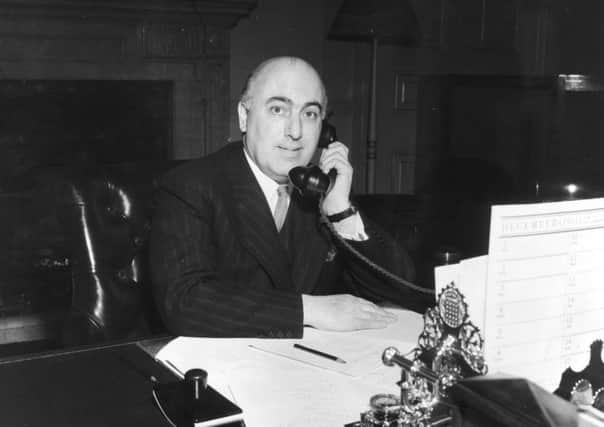Scottish prosecutor, who played a leading role in bringing the architects of the Third Reich to justice, remembered


Now some 75 years after he played a leading role in the Nuremberg War Trials by rigorously questioning Hermann Göering, the family of one of Scotland’s most acclaimed legal minds is to pay tribute to his life and achievements.
Sir David Maxwell Fyfe served as Britain’s deputy chief prosecutor during the historic trials, conducting cross-examinations which to this day are regarded as among the most significant in modern jurisprudence.
Advertisement
Hide AdAdvertisement
Hide AdThe politician and barrister, born in Aberdeen and raised in Edinburgh, spent a year reviewing Nazi atrocities for the trials, an experience that spurred him on to help compose the first draft of what would become the European Convention of Human Rights (ECHR).
With Britain now bowing out of the grand European project Sir David helped create, his relatives hope to inform a new generation about his remarkable legal legacy.
Dreams Of Peace And Freedom, a multimedia show that weaves together the Scot’s words with poetry and music, is the brainchild of his grandson, Tom Blackmore, a theatre director.
Together withnhis wife, Sue Casson, a composer, and Sir David’s great-grandchildren, Lily Casson and Robert Blackmore, the family will embark on a UK tour later this year, including performances in Edinburgh and Dornoch.
According to Lily, a singer and actor, growing intolerance and anti-Semitism across Europe “shows why we must remember what happened in the past to stop it from being repeated”.
She explained: “The show is a way of keeping a forgotten piece of history alive for new generations to discover. Very few people of my generation know about it.”
The show recounts the horror felt by Sir David as he pored over the evidence, including 19 minutes video footage, shot by Russian forces at Auschwitz in January 1945.
Advertisement
Hide AdAdvertisement
Hide AdAs well as capturing some of the survivors, the video showed the clothes of dead infants and children the same age as Miranda, his then seven-year-old daughter. Sir David, among the first to view it, was deeply moved and it strengthened his resolve.
In a letter to his wife, Sylvia, Sir David confided: “It is worth a year of our lives to help to register for ever and with practical result the reasoned horror of humanity.”
Lily added: “He saw that Nuremberg was a matter of record as well as natural justice. The shock of the film was the evil, the terror and the brutality, but more that it was planned and justified.”
The performances also touch on other aspects of Sir David’s remarkable career, which saw him become the youngest King’s Counsel in 250 years when he was appointed at the age of just 34. A year later, in 1935, he was elected as the Conservative MP for Liverpool West Derby, and by 1942 Winston Churchill named him Solicitor General in his wartime coalition government. Three years later, he served a brief stint as Attorney General.
Impressive though such positions were, they became footnotes when compared with his achievements at Nuremberg and, later, with the creation of the ECHR.
At the convention’s signing on 4 November, 1950, he delivered a rousing speech.
“Some may say that it is of doubtful value that the democratic nations should reinforce individual liberty among themselves and leave the totalitarian states untouched,” he said.
Advertisement
Hide AdAdvertisement
Hide Ad“We do not accept this pessimistic view. We consider that our light will be a beacon to those at the moment in totalitarian darkness and will give them a hope of return to freedom.”
For Lily, the threats to human rights and liberties in the 21st century mean that reminding the wider world of her great-grandfather’s work has never been more important.
“The ECHR was never going to be perfect, but what matters is that it came into existence at all. It’s something that can be built upon, changed, and modified to fit the world as it changes,” she said.
For more information, visit www.thehumansinthetelling.org